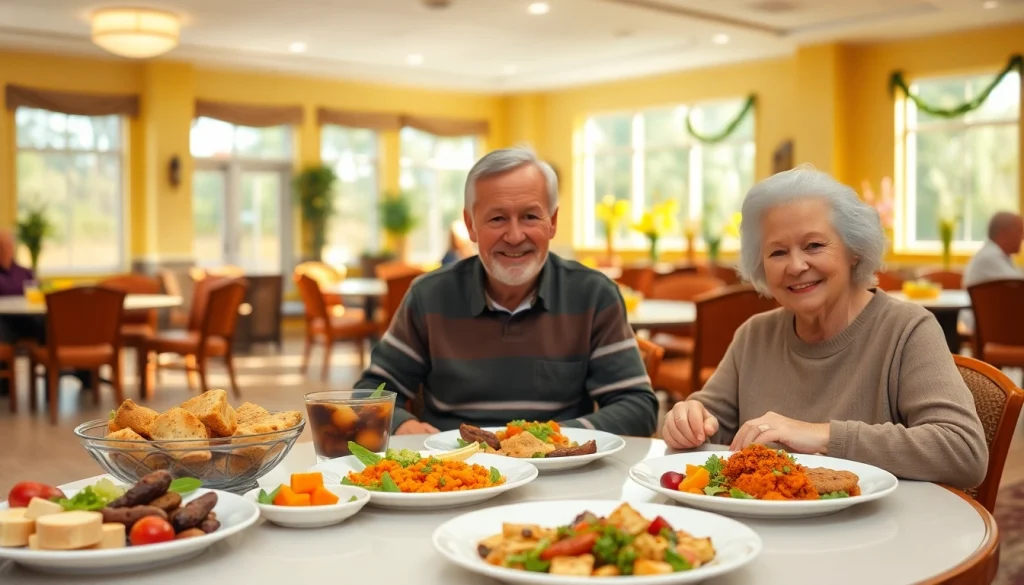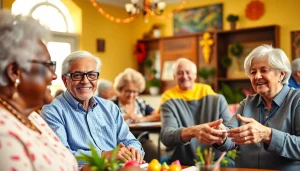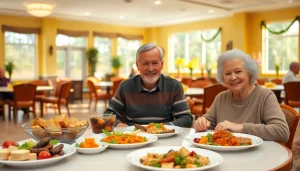
Introduction to Henderson NV Senior Center Menu
The henderson nv senior center menu plays a crucial role in the daily lives of seniors residing in the area, providing them with more than just food. Through well-planned meal programs, senior centers come together with the community to offer healthy and nutritious options that cater to the diverse needs of their older population. Beyond sustenance, these menus are integrated into a broader framework of care and services designed to enhance the quality of life for seniors.
Overview of Senior Dining Services
Senior dining services are critical components of community health programs, focusing on providing balanced meals to those aged 60 and above. These services promote social interaction among seniors, encouraging them to share meals, which can combat loneliness and foster friendships. Most senior centers evaluate their menus based on various factors that influence nutritional value, including local produce availability, seasonal changes, and dietary guidelines prescribed by health professionals. These elements are essential in assembling a menu that not only satisfies hunger but also supports overall health.
Importance of Nutrition for Seniors
Nutrition plays a pivotal role in the well-being of seniors. As individuals age, bodily processes slow down, and nutritional needs change. A well-balanced diet becomes essential in preventing malnutrition, supporting cognitive health, and managing chronic conditions such as diabetes and heart disease. Meals designed for seniors typically focus on high fiber, lean protein, healthy fats, and a plethora of vitamins and minerals. By carefully crafting the henderson nv senior center menu, administrators aim to provide meals that fulfill these dietary needs, ultimately contributing to a higher quality of life.
Key Features of Senior Menus
Menus at senior centers like those in Henderson are characterized by a few essential features:
- Variety: Menus are designed to include a range of food options, ensuring that all taste preferences are catered to. This can involve cuisines from different cultures, vegetarian options, and foods from local ingredients.
- Seasonal Changes: Adapting menus according to the seasons ensures the inclusion of fresh produce, which enhances flavor and nutrient content.
- Portion Control: The serving sizes are carefully calculated to meet the dietary requirements of seniors without promoting overeating.
- Cultural Relevance: Menus often reflect the backgrounds of the seniors they serve, incorporating familiar dishes that resonate culturally.
Types of Meals Offered in Henderson NV Senior Center Menu
Breakfast Options for Energized Mornings
Breakfast is often deemed the most important meal of the day, particularly for seniors who need energy to carry out their daily activities. The variety of breakfast options offered at senior centers typically include:
- Whole Grains: Oatmeal, whole grain breads, and cereals serve as excellent sources of fiber and nutrients, promoting digestive health.
- Fruits and Vegetables: Fresh fruits such as berries, bananas, and seasonal fruits are often incorporated, either as side dishes or smoothies, providing essential vitamins and antioxidants.
- Lean Proteins: Low-fat yogurt, eggs, or nut butters are included to offer protein, which helps maintain muscle mass and overall health.
- Dairy Alternatives: Options like almond milk or lactose-free yogurt are available for those with lactose intolerance.
Healthy Lunch Selections for Active Afternoons
Lunch menus at senior centers are typically diverse and balance whole grains, proteins, healthy fats, and an adequate intake of fruits and vegetables. Some common entries include:
- Salads: Fresh salads loaded with leafy greens, colorful vegetables, and lean proteins such as chicken or beans foster a nutritious midday meal.
- Sandwiches and Wraps: Multi-grain wraps filled with turkey, hummus, or roasted vegetables provide convenience and balanced nutrition.
- Soups: Low-sodium vegetable or chicken soups can be filling and hydrating, often served with whole grain bread.
- Quinoa or Brown Rice Bowls: These bowls often include a medley of vegetables and proteins, appealing to seniors looking for wholesome and hearty meals.
Wholesome Dinner Choices to End the Day
Dinner menus focus on providing comfort while ensuring balanced nutrition. Common offerings may include:
- Protein Choices: Grilled fish, baked chicken or turkey, and low-fat meats are standard choices aimed at driving protein intake.
- Vegetable Medleys: Steamed or roasted vegetables not only add color to the plate but are crucial for fiber and vitamins.
- Whole Grain Starches: Brown rice, quinoa, or whole-wheat pasta provide essential carbohydrates needed to keep energy levels stable.
- Healthy Fats: It is common to see avocado, nuts, or olive oil included in meals to promote heart health among seniors.
Special Dietary Needs in the Henderson NV Senior Center Menu
Gluten-free and Allergy-Friendly Options
Being conscientious of food allergies and dietary restrictions is crucial for senior centers. Menus are usually adjusted to ensure they offer gluten-free options and cater to common allergens, including nuts, dairy, and soy. This includes:
- Substitute Ingredients: Using nut flours instead of wheat flour or offering alternative milks can make meal options accessible to those with specific dietary needs.
- Clear Labeling: All meals are usually labeled to help seniors identify suitable options easily.
Meal Plans for Specific Health Conditions
Many seniors manage chronic health issues that require careful dietary attention. For instance, menus may provide:
- Low Sodium Options: Meals designed for individuals with hypertension or heart conditions are often prepared with minimal salt, offering flavorful herbs and spices instead.
- Diabetic-Friendly Meals: Choices that maintain an appropriate glycemic index, focusing on low-sugar and high-fiber ingredients, can aid seniors with diabetes in managing their condition.
- Heart-Healthy Choices: Low-fat, nutrient-rich dishes that support cardiovascular health are prioritized for those needing to watch their heart health.
Importance of Personalized Nutrition
Understanding that every senior has unique dietary needs is fundamental to offering effective nutrition services. Personalized nutrition can include individual consultations that assess health conditions, preferences, and former eating habits. This tailored approach establishes stronger dietary adherence among seniors and ensures they receive the most beneficial nutritional support.
Activities and Events Complementing the Henderson NV Senior Center Menu
Social Events and Their Impact on Well-being
Dining is inherently social, and many senior centers take advantage of this by hosting communal meals, cooking classes, and seasonal celebrations. These gatherings create a supportive atmosphere where relationships can flourish, significantly boosting mental and emotional well-being. Participating in social events related to meals helps combat loneliness, fosters community spirit, and enhances seniors’ overall health.
Special Theme Days and Celebrations
Many senior centers incorporate themed meal days into their calendars. Popular themes may include:
- Cultural Celebrations: Offering food representative of various cultures can foster inclusion and educate seniors about diverse cuisines.
- Holiday Events: Special meals during holiday seasons provide a festive environment that reinvigorates their spirits.
- Health Awareness Days: Meals crafted around specific dietary topics, such as heart health awareness, heighten guests’ understanding of nutrition.
How Meals Facilitate Community Connections
Meals serve as a focal point for promoting interaction among seniors. Cooking demonstrations, potlucks, or dining events are platforms that bolster friendships and encourage networking. Establishing connections through shared meals ultimately enhances the sense of belonging and provides social engagement opportunities.
Accessing the Henderson NV Senior Center Menu
How to Sign Up for Meals and Services
Signing up for meals and services at senior centers often involves a straightforward process. Generally, seniors or their caretakers may contact their local senior center directly. Registration may include providing demographic information, dietary needs, and preferences. Some centers offer online registration for added convenience. It is also important for seniors to engage with outreach programs and local services that help navigate meal options and services available to them.
Importance of Regular Updates and Communication
Maintaining an effective communication channel between seniors and the center is vital. Regular updates about new menu items, weekly specials, or changes in dietary policies can be delivered through newsletters or informational sessions. Utilizing both digital options, such as websites and social media, along with traditional methods like bulletin boards and flyers, ensures all seniors are informed.
Resources for Additional Support and Information
In addition to meal services, senior centers often provide a range of supportive resources that can further enhance the lives of older adults. Collaborations with local health organizations, workshops on nutrition, health screenings, and fitness classes are commonly part of the community outreach. Directing seniors to resources like meal delivery services or nutritional counseling can also provide substantial support, enabling them to better navigate their dietary needs.






